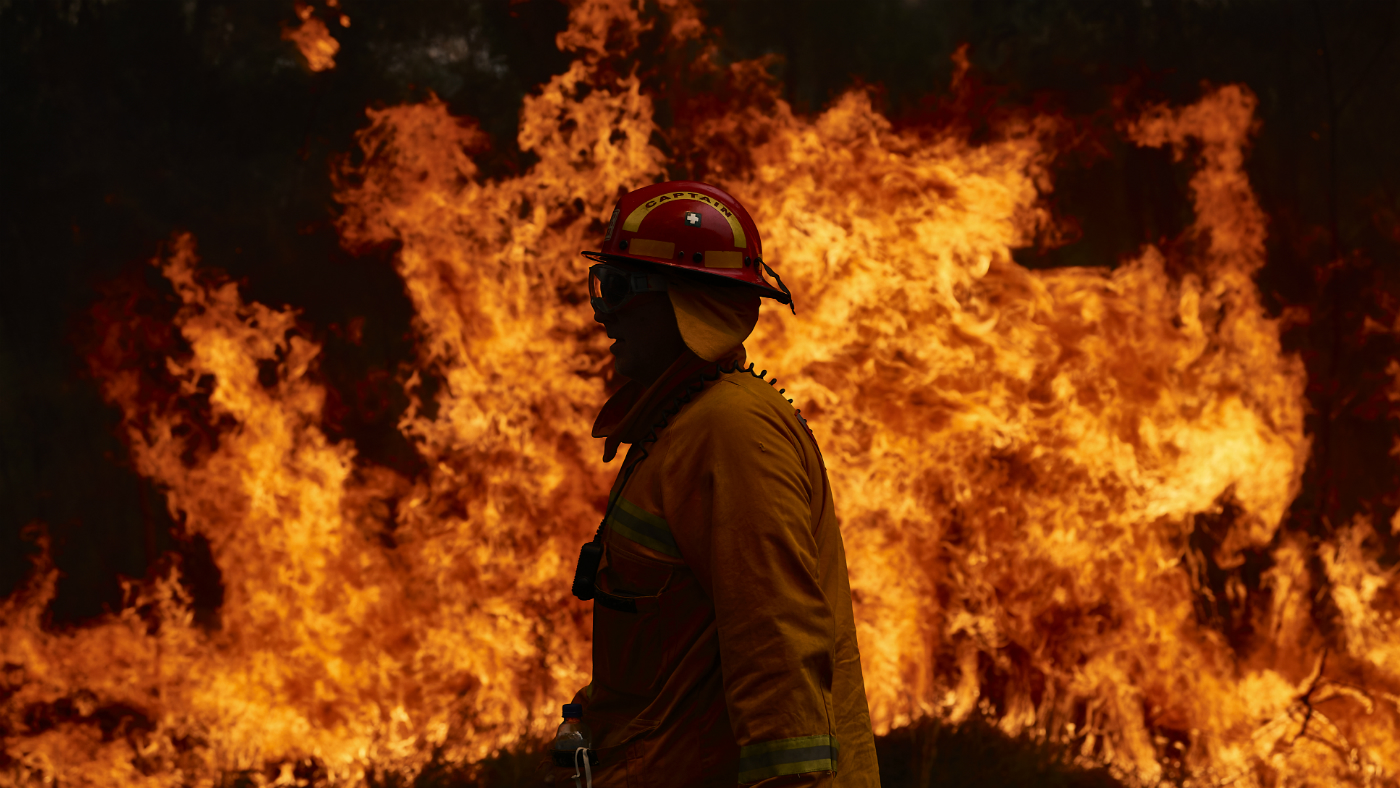Why Australia’s government is unmoved on climate change
New South Wales declares second state of emergency in as many months as bushfires ravage region

A free daily email with the biggest news stories of the day – and the best features from TheWeek.com
You are now subscribed
Your newsletter sign-up was successful
The government of New South Wales (NSW) has declared a state of emergency in the southeastern Australian state after the country endured its hottest day on record - just 24 hours after the previous record was smashed.
On Tuesday, the mercury soared to a national average of 40.9°C, beating the previous record of 40.3C set in 2013. And temperatures continued to climb on Wednesday, hitting an average maximum of 41.9°C.
The extreme heatwave comes as firefighters in drought-stricken NSW battle to contain around 100 wildfires that have been burning for weeks across the region, blanketing Sydney in a toxic layer of smoke.
The Week
Escape your echo chamber. Get the facts behind the news, plus analysis from multiple perspectives.

Sign up for The Week's Free Newsletters
From our morning news briefing to a weekly Good News Newsletter, get the best of The Week delivered directly to your inbox.
From our morning news briefing to a weekly Good News Newsletter, get the best of The Week delivered directly to your inbox.
As the crisis grows, Australia is facing criticism “for what have been described as inadequate climate policies, including the role of federal officials in thwarting negotiations at a recent UN summit on climate change”, says NBC News.
What is the current situation?
Temperatures are expected to continue rising to near 50°C in parts of South Australia and to peak at 45°C in the western suburbs of Sydney, “while turbulent winds of up to 60mph are expected to fan bushfires burning ever closer to the city”, says The Telegraph.
The blast of extreme heat follows weeks of above-average temperatures that have left NSW authorities struggling to tackle an unprecedented number of blazes since this year’s bushfire season began early in September.
A free daily email with the biggest news stories of the day – and the best features from TheWeek.com
Announcing a seven-day state of emergency on Thursday, NSW Premier Gladys Berejiklian said: “The biggest concern over the next few days is the unpredictability, with extreme wind conditions [and] extremely hot temperatures.”
–––––––––––––––––––––––––––––––For a round-up of the most important stories from around the world - and a concise, refreshing and balanced take on the week’s news agenda - try The Week magazine. Start your trial subscription today –––––––––––––––––––––––––––––––
Why is the government facing criticism?
The Australian government has long been lambasted for its perceived inaction over climate change. Australia scored zero out of 100 on policy in the latest international 2020 Climate Change Performance Index, and came 56th out of 61 countries overall.
“Experts note that the new government is an increasingly regressive force in negotiations and has been criticised for its lack of ambition,” according to a report from the environmental think-tanks behind the index.
Prime Minister Scott Morrison has also been criticised personally for refusing requests to meet with former fire chiefs to discuss the bushfires and rejecting calls to professionalise the largely volunteer bush fire services.
Australia has also been blamed for resisting pressure to ramp up efforts legislation on climate change at a “disappointing” UN summit in Madrid this week, reports Sydney-based site News.com.au. The UN Climate Change Conference, known as COP25, saw Australia, Brazil and the US blocking progress on Article Six of the Paris Climate Accord, which would have allowed countries to pay each other for projects that reduce emissions.
Climate activists are hitting the streets of Sydney and other Australian cities to protest against Morrison’s focus on protecting the country’s lucrative coal export industry rather than tackling climate change.
-
 How to Get to Heaven from Belfast: a ‘highly entertaining ride’
How to Get to Heaven from Belfast: a ‘highly entertaining ride’The Week Recommends Mystery-comedy from the creator of Derry Girls should be ‘your new binge-watch’
-
 The 8 best TV shows of the 1960s
The 8 best TV shows of the 1960sThe standout shows of this decade take viewers from outer space to the Wild West
-
 Microdramas are booming
Microdramas are boomingUnder the radar Scroll to watch a whole movie
-
 The plan to wall off the ‘Doomsday’ glacier
The plan to wall off the ‘Doomsday’ glacierUnder the Radar Massive barrier could ‘slow the rate of ice loss’ from Thwaites Glacier, whose total collapse would have devastating consequences
-
 Can the UK take any more rain?
Can the UK take any more rain?Today’s Big Question An Atlantic jet stream is ‘stuck’ over British skies, leading to ‘biblical’ downpours and more than 40 consecutive days of rain in some areas
-
 As temperatures rise, US incomes fall
As temperatures rise, US incomes fallUnder the radar Elevated temperatures are capable of affecting the entire economy
-
 The world is entering an ‘era of water bankruptcy’
The world is entering an ‘era of water bankruptcy’The explainer Water might soon be more valuable than gold
-
 Climate change could lead to a reptile ‘sexpocalypse’
Climate change could lead to a reptile ‘sexpocalypse’Under the radar The gender gap has hit the animal kingdom
-
 The former largest iceberg is turning blue. It’s a bad sign.
The former largest iceberg is turning blue. It’s a bad sign.Under the radar It is quickly melting away
-
 How drones detected a deadly threat to Arctic whales
How drones detected a deadly threat to Arctic whalesUnder the radar Monitoring the sea in the air
-
 ‘Jumping genes’: how polar bears are rewiring their DNA to survive the warming Arctic
‘Jumping genes’: how polar bears are rewiring their DNA to survive the warming ArcticUnder the radar The species is adapting to warmer temperatures